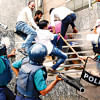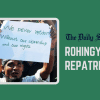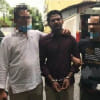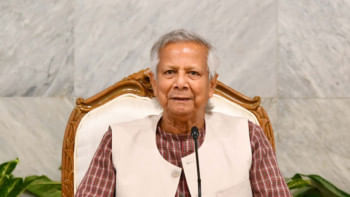HRW slams ban on AL activities

Recent legislative initiatives by Bangladesh's interim government risk undermining fundamental freedoms, said Human Rights Watch yesterday.
Instead of pursuing its pledge to reform the criminal justice system and bring accountability for serious abuses, the government, led by Nobel laureate Muhammad Yunus, is attempting to "suppress the rights" of supporters of the deposed leader, Sheikh Hasina, and the Awami League party, it said in a report.
On May 12, the interim government ordered a "temporary" ban on the Awami League using newly introduced powers under a draconian amendment to the Anti-Terrorism Act, it added.
Meanwhile, draft legislation to address enforced disappearances, which were widespread under the previous government, does not meet international standards and scarcely addresses accountability for past crimes.
"Sheikh Hasina's government abused legal powers to silence political opponents, but using similar methods against the supporters of her Awami League party would also violate those same fundamental freedoms," said Meenakshi Ganguly, deputy Asia director at HRW.
The ban on the Awami League will apply until party leaders have faced trial for abuses committed during their 15-year rule, a process that could last years, thus effectively proscribing the party, said the New York-based international rights body.
These moves came in the wake of the interim government's ordinance amending the International Crimes (Tribunals) Act, 1973, which gives the Tribunal powers to prosecute and dismantle political organisations.
The new provision defines "organisation" expansively to include any political party or affiliated group, or individuals who are deemed to propagate or support their activities.
Because these powers are drafted so broadly, they could contravene international standards of due process and freedom of association.
Additionally, the Tribunal is empowered to punish "any group of individuals which, in the opinion of the Tribunal, propagates, supports, endorses, facilitates, or engages in the activities of such a [banned] party or entity".
Those accused of committing crimes under Hasina's government should be appropriately prosecuted but imposing a ban on any speech or activity deemed supportive of a political party is an excessive restriction on fundamental freedoms that mirrors the previous government's abusive clampdown on political opponents, HRW said.
Already a wide range of people including actors, lawyers, singers and political activists have been arrested on politically motivated murder charges, with prosecutors justifying the arrests by accusing them of backing the "rule of fascist Hasina".
Meanwhile, there is growing concern over delays in addressing serious abuses that occurred under the Awami League government.
On August 27, 2024, the interim government established a commission to investigate enforced disappearances under Hasina's rule.
The commission recorded 1,676 complaints, with some 200 victims still missing, revealing a systematic pattern targeting political opponents and uncovering evidence of torture at secret detention sites run by security agencies.
However, the proposed legislation on enforced disappearances does not mention any role for the commission's findings, and excludes enforced disappearances committed in a "widespread" or "systematic" manner, leaving them to the jurisdiction of Bangladesh's under-resourced and controversial International Crimes Tribunal.
While the proposed disappearance law would establish a new National Commission on the Prevention and Remedy of Enforced Disappearances, there are no provisions to ensure its independence.
Criminal cases of those suspected of enforced disappearances would be prosecuted by a new Tribunal for Prevention and Remedies of Enforced Disappearance.
However, neither body would have jurisdiction over "widespread or systematic" enforced disappearances that constitute crimes against humanity, which constitute most cases committed under the previous government.
While the legislation would criminalise anyone who aids, abets, instructs, orders or conspires in a disappearance, it sets a stricter threshold for the application of command or superior responsibility compared to the Rome Statute of the International Criminal Court.
The interim government should reverse its actions to protect the rights of freedom of expression of the AL members and supporters and focus instead on prosecuting members of the former government accused of crimes based on credible evidence.
It should refrain from politically motivated pretrial detentions and ensure that they remain the exception only when necessary in an individual case and not the rule.
The priority should be to deliver justice for human rights violations, particularly unlawful killings and enforced disappearances.
The government should use evidence gathered by the commission of inquiry to investigate enforced disappearances to prosecute alleged perpetrators, remove suspects in the security forces from active duty and reveal the fate of the missing.
"There is widespread anger against the Awami League for the many abuses committed during Hasina's rule, but stripping supporters of opposition parties of their rights isn't a way forward."
Instead, the interim government should ensure progress on revealing what happened to the disappeared and holding perpetrators accountable through fair trials, Ganguly added.

 For all latest news, follow The Daily Star's Google News channel.
For all latest news, follow The Daily Star's Google News channel. 








Comments